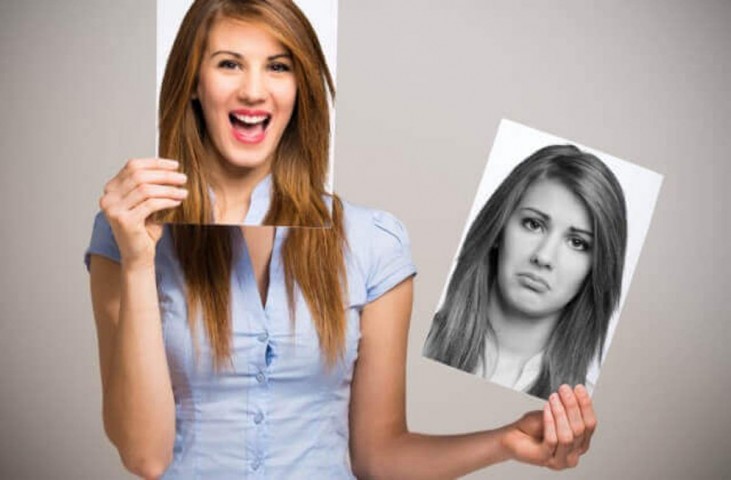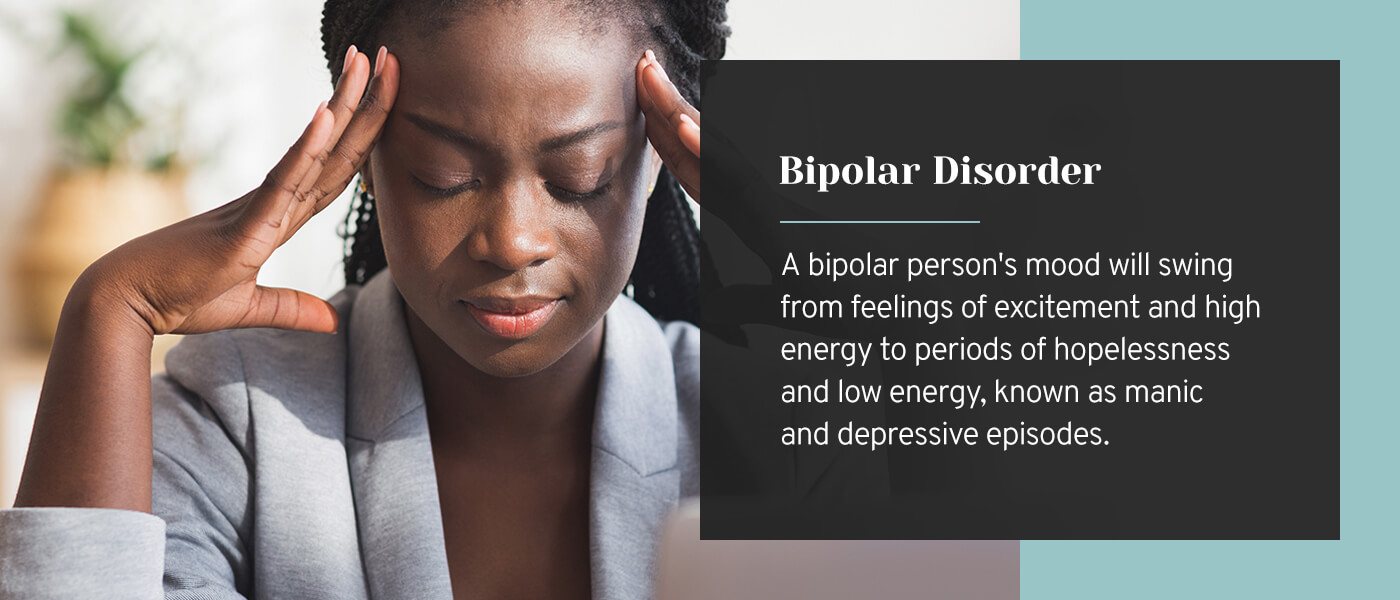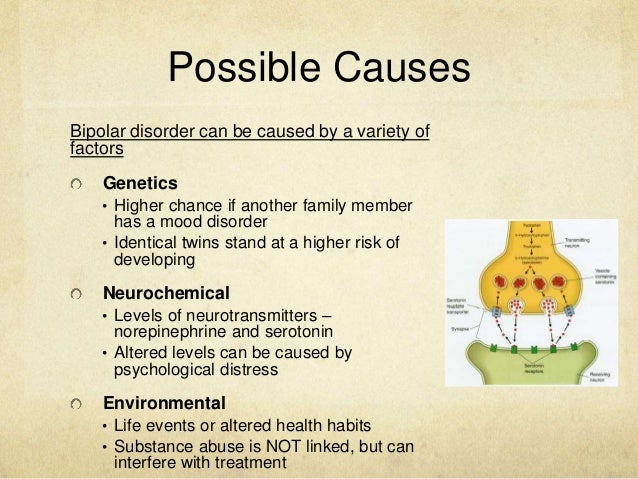108 Glen Osmond Road, Parkside

Bipolar Syndrome (BPAD) :
Bipolar disorder, previously known as manic depression, is a psychiatric illness that affects up to 1 in 50 Australians. Bipolar disorder is a mental health condition marked by extreme swings in mood and energy. It can affect the ability to function normally. The mood changes of bipolar disorder are more severe than normal ups and downs. They can hurt relationships and cause poor job or school performance.
The two mood extremes of bipolar disorder are mania and depression. Mania is an increase in energy and a decreased need for sleep. The mood may be overly happy or irritable. In depression, a down mood with heavy fatigue takes over. Irritability is common with depression, too.

There are 4 forms of bipolar disorder:
* Bipolar I disorder—Repeated episodes of mania, often immediately followed by depression. These episodes can be severe.
The exact cause of bipolar disorder is not known, although it would seem that genetics does play a large role. One theory proposed by psychiatrists and psychologists is that the illness might be caused by a chemical imbalance in the brain. It is thought that, in patients with bipolar disorder, the chemicals in the brain that help regulate mood (known as norepinephrine and serotonin) are easily skewed. Most people affected by bipolar disorder are in their 20s when they are first diagnosed.

Bipolar disorder, also known as manic depressive disorder or manic depression, is a psychiatric disorder that causes extreme shifts in mood, energy, activity levels, and the ability to carry out everyday tasks. A person suffering from bipolar disorder experiences two extremes with distinct signs and symptoms:
Symptoms of bipolar disorder can be severe and disabling and frequently contribute to worsening symptoms of addiction or eating disorders in patients with co-occurring disorders. Bipolar episodes are different from the normal swings in feelings or moods that everyone goes through from time to time.
Both mood and behavioral changes can be signs indicating someone with bipolar disorder is experiencing a manic phase or episode:
* Feeling over-excited and extremely energetic
When a person suffering from bipolar disorder enters a depressive phase, the signs and symptoms create a stark contrast with the preceding manic episode:

During particularly severe episodes of either mania or depression, a person suffering from bipolar disorder may experience psychosis. Psychosis is the term for a state of detachment from reality, which may be either temporary or prolonged. Bipolar psychosis is characterized by two types of symptoms:
Ayurvedic concept of Bipolar Disorder BPAD :
Ayurvedic descriptions of mental illness are mainly incorporated under the heading of "Unmada". The term Unmada comprises all psychiatric disorders and can be translated as psychosis. In Ayurvedic texts, there is a detailed explanation of “Unmada”. Unmada is a kind of insanity that affects the mind, intellect, consciousness, knowledge, memory, inclination, manners, activities, and behavior. There are five known classifications of Unmada, and some symptoms of Bipolar disorder are similar to these, and a few others are parallel to the description of the classification. Unmada's five types are- Vataja, Pittaja, Kaphaja, Sannipataja, and Agantuja or Bhootonmada. Vataja unmada is characterized by various inappropriate behaviors like smiling, laughing, dancing without reason, excessive talking, and wandering. In Pittaja unmada, restlessness, anger, sleeplessness, and hostility are the predominant features whereas in Kaphaja unmada, loss of appetite, psychomotor retardation, solitude, and excessive sleepiness are the predominant features.

The three gunas (Tamas, Rajas, Sattva) of the mind play a crucial role in altering the individual's mood. A person with Tamas (meaning ‘darkness’) is felt as dullness or darkness of mood and as physical indolence, heaviness, or lethargy. Raja's bhava is felt as agitation, desire, instinct, determination, and passion, and expressed as physical tension, distress, excitement, and activity in all its forms. Whereas Satva is felt as pureness, radiance, calm lucidity, balance, and a buoyant lightness of being. Every individual’s mood constantly embodies a diverse combination of the three Gunas.

Causes of Bipolar according to Ayurveda :
According to Ayurveda, Bipolar disorder is caused by to imbalance of vata, pitta, and kapha dosha and the mental properties sattva, rajas, and tamas. Ayurveda associates it mainly with the aggravated and imbalanced Vata Dosha – the energy that controls the brain and the nervous system.
Ayurvedic experts also consider bipolar disorder as a lack of stability or Ojas (which signifies strength, immunity, and vitality). Ojas can be considered the essence of all seven Dhatus that are present in the body. A decrease in the level of Ojas may lead to difficulty in nourishing emotional responses.
Changes in the underlying emotions are brought on by vata-provoking qualities in the individual’s lifestyle, habits, foods, and activities, as written below :
Treatment of Bipolar Disorder BPAD in Ayurveda :

Ayurvedic treatment helps in balancing the imbalanced or aggravated dosha, increases the ojas, and also enhances the sattva guna of the individual. Ayurvedic treatment of bipolar disorder is focused on strengthening the overall physical and mental health. The Ayurvedic treatment is complex, complicated, and, at the same time, strictly individual according to the specific imbalances in the general health condition of the patient.
Ayurveda has described three types of management for treating psychiatric disorders or unmada as follows:
1. Daiva vyapashraya chikitsa
(spiritual/divine therapy),
2. Sattvavajaya chikitsa (Ayurvedic
psychotherapy) and
3. Yukti vyapashraya chikitsa (rational use
of drugs, diet, and activities). Yukit vyapashraya chikitsa
includes samshodhana (elimination of vitiated dosha by panchakarma therapy) and samshamana (pacifying dosha by giving internal medicines, diet, or activities).
Ayurvedic Panchakarma therapies recommended are:-

Herbal formulations recommended are :

Along with the above-mentioned herbs and Ayurvedic Panchakarma therapies, Yoga, Pranayama, and meditation play a very important role in enhancing the Satva guna. A bipolar person in the state of Tamas will benefit from yoga, pranayama, and meditation. The mental status is enhanced from Tamasic to Rajasic and then to Satva Guna. It soothes the mind and balances the internal and external energy of the body. It helps the individual to expand his thoughts and think better. Deep breathing and yoga asana practice have a tremendous effect on the mind and body. Regular practice of this helps a bipolar sufferer balance his emotions and moods.
Recommended Food habits to increase Satvic guna are :
* Fresh and light foods such as vegetables, milk, fruits, most grains, split or whole mung dhal, and almonds increase calmness, clarity, and creativity of the mind — in other words, they enhance Sattva.
* During cooking, use ghee as a medium. Because ghee is clarified butter, free of milk solids, proteins, and water, it has amazing nutritive and medicinal qualities, besides being extremely flavorful and aromatic. Its penetrative qualities make it an excellent medium for aiding the absorption of nutrients by the body, while also lubricating the tissues.
* Strictly avoid any refrigerated, processed, artificially colored, canned, and chemically preserved foods as far as you can. They increase ama, or toxic undigested matter in the physiology; tax the body’s Agni, or digestive fire; lack vitality; and do not stimulate your Sattva.
Ayurvedic bipolar treatment is becoming more and more popular as people want to avoid the side effects of medication drugs and want to turn to more natural approaches. Ayurveda can help stabilize the mood swings of a person with bipolar disorder. This can also help immensely in promoting better concentration. This can also help greatly in calming the nerves and has mild sedative effects. If you or your loved one is suffering from these types of health issues, you can book an appointment with our expert Ayurvedic doctors to discuss a customized treatment plan.
Disclaimer : Sandeep Kumar and Anupam Vasudeva are not GP, they have Ayurveda medical degree from India where it is considered equal to any other medical degree. This qualification is recognized in Australia by vetassess governing body as Complementary Health Therapists. Life Line Ayurvedic Herbal Clinic does not claim to cure a disease or terminal illness and does not create any unreasonable expectation of beneficial treatment. Ayurvedic medicines and treatments are generally considered to be safe but rarely may be associated with possible adverse reactions in individual cases. We recommend seeking urgent medical attention in the case of an adverse reaction. This website provides you with information. You must contact your Ayurvedic or another health professional before you apply them. Read More